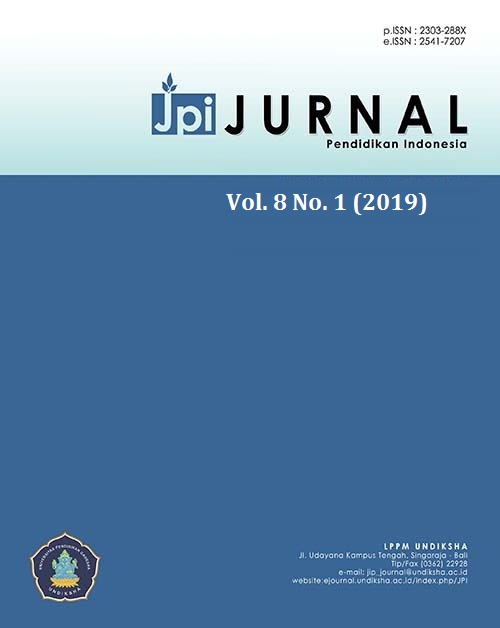Factors Influencing the Improvement of Students’ Writing Skill Through Peer Editing Technique
DOI:
https://doi.org/10.23887/jpi-undiksha.v8i1.15431Keywords:
peer editing technique, recount textAbstract
This research investigated the students’ writing skill on recount text at session at session 2016 A English Department of STKIP West Sumatera. Some of them had difficulties in organization, content, grammar, mechanic, and vocabulary. Then, they really need lecturers’ correction in every step of their writing process. Therefore, the researcher applied peer editing technique as the focus of research to solve this problem. The purposes were to find whether peer editing technique can improve students’ writing skill on Recount Text and some factors influence the improvement. The methodology of research is a classroom action research (CAR). Researcher used writing test and questionnaire as the instruments. The finding of the research showed that the students’ writing skill of recount text improves through Peer Editing technique and there are four factors influenced the improvement.
References
Amato, R. and Patricia, A. (2003).Making It Happen.New York: Longman.
Arini, D. N. (2012). “Using Peer Editing and Revising in Process Approach to Improve the Students' Ability in Writing Argumentative Essay at Lambung Mangkurat University”. Unpublished Thesis Abstract. Malang: UNM. Retrieved on January 24th 2013 fromhttp://karya-ilmiah.um.ac.id/index.php/disertasi/article/view/23751
Balusy, Z. (2013). Peer Editing. Language Centre,SultanUniversity. Retrivied on January 24th 2013 fromhttp://www.developinglecturers.com/articletchtraining/peeredpf
Baroroh,M. 2011. “The Use of Mind Mapping and Peer-Editing to Improve Students’ Writing Skill (A Classroom Action Research Conducted at the Tenth Grade Students of SMA Negeri I Karanganyar in the Academic Year of 2010/2011)”.Unpublished Thesis Abstract. Surakarta: UNS. Retrieved on January 24th 2013 fromhttp://digilib.fkip.uns.ac.id/contents/skripsi.php?id_skr
Bolton,S.D. (2013). The Dialogue Journal: A Tool for Building Better Writers. English Teaching Forum. 2, pp. 4
Brown, H.D . 2001. Teaching by Principles: An Interactive Approach to Language Pedagogy. New York: Addison Wesley Longman, Inc.
Corbett, Pie and Julia Strong. (2011). Talk for Writing Across the Curriculum. New York: McGraw-Hill Companies.
Creswell, J. W. 2012. Educational Research: Planning, Conducting, and Evaluating Quantitative and Qualitative Research.Boston: Pearson.
Fajriah,A.2012. “Improving Students’ Writing Skill in Descriptive Text through Brainstorming and Peer Editing Techniques at Third Grade Students’ of Sentolo Kulon Progo” Unpublished Thesis Abstract. Yogyakarta: UNY. Retrieved on January 24 th 2013 from http://eprints.uny.ac.id/1196/
Gay, L.R. and Peter,A. 2000. Educational Research: Competencies for Analysis and Application. New Jersey: Prentice Hall, Inc.
Hadley, A. O. (2001). Teaching Language in Context. New York: Heinle&Heinle.
Harmer, J. (2007).How to Teach English. Harlow: Pearson Longman.
Hedge, T. (2007). Teaching and Learning in the Language Classroom. New York: Oxford University Press.
Kemmis, S. and Robin, Mc. T. (ed.). (1998). The Action Research Planner (3 rd ed). Victoria: Deakin University.
Knapp, Petter and Meggan Watkins. (2005). Genre Text Grammar: Technologies for Teaching and Assessing Writing. Sidney: University of New South Wales Press Ltd.
Lyutaya, T. (2011). Reading Logs:Integrating Extensive Reading with Writing Tasks. English Teaching Forum. 1, pp. 4.
Marsh, V.L. (2018). Portal and Gatekeeper: How Peer Feedback Functions in a High School Writing Class. Research in the Teaching of English .53, pp. 149-172.
Nahdi, M. 2011. “Improving Students’ Writing Ability by Using Peer Editing Technique (A Classroom Action Research at the Third Semester Students of English Study Program of STKIP Hamzanwadi Selong in Academic Year of 2010/2011)”. Unpublished Thesis Abstract. Surakarta: UNS. Retrieved on January 24 th 2013 fromhttp://pasca.uns.ac.id/?p=1685
Nation, I.S.P. (2009).Teaching ESL/EFL Reading and Writing. New York:Routledge.
Oshima, A and Ann, H. (2007). Introduction to Academic Writing. New York: Pearson Longman.
Rathvon, N. (2008). Effectives School Interventions: Evidence- Based Strategies for Improving Student Outcomes. New York: Guilford Publications, Inc.
Wardiman, Antono. (2005). Make Your Self a Master of English. Jakarta: PT. Setia Purna Inves.
Weigle, Sarah Cushing. (2002). Assessing Writing. Cambridge: Cambridge University Press
Downloads
Published
Issue
Section
License
Authors who publish with the Jurnal Pendidikan Indnesia agree to the following terms:
- Authors retain copyright and grant the journal the right of first publication with the work simultaneously licensed under a Creative Commons Attribution License (CC BY-SA 4.0) that allows others to share the work with an acknowledgment of the work's authorship and initial publication in this journal.
- Authors are able to enter into separate, additional contractual arrangements for the non-exclusive distribution of the journal's published version of the work (e.g., post it to an institutional repository or publish it in a book), with an acknowledgment of its initial publication in this journal.
- Authors are permitted and encouraged to post their work online (e.g., in institutional repositories or on their website) prior to and during the submission process, as it can lead to productive exchanges, as well as earlier and greater citation of published work. (See The Effect of Open Access)








